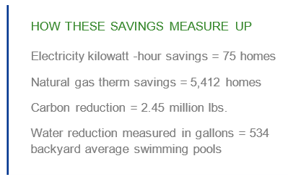
When Providence announced its goal to be carbon negative by 2030, Michael Nafzgar, manager of facilities at Sacred Heart Medical Center, in Spokane, WA, took this opportunity to resurrect a committee – BTU Bombers 2.0. This collaboration includes RESO facility team members, vendors, and utility company representatives, supported by Geoff Glass, senior technical program manager, Energy & Sustainability. The committee now meets monthly to evaluate opportunities for energy and water savings and implement cost-savings measures. The committee’s goal is to meet the Clean Buildings Act of Washington State, which establishes energy efficiency targets for large commercial buildings, in advance of the mandatory compliance dates.
BTU refers to a British thermal unit and is defined as the amount of heat required to raise the temperature of one pound of water by one-degree Fahrenheit. It is the measurement used to determine energy usage. Through the committee’s work, the medical center realized cost savings due to a consumption reduction of approximately $183,000 in 2020. Changes implemented resulted in the reduction of electricity, natural gas, and water usage.
The committee was able to achieve these critical utility reductions through no-cost, low-cost changes. By implementing night and weekend ventilation setbacks for unoccupied spaces, the team realized an opportunity to reduce utility usage. The facility team implemented speed controls on select fan systems, modernized controls for improved continual monitoring of building systems, and the improvement of building automation system setpoints for energy efficiency. By working with the utility companies, specifically water and sewage, the medical center received utility credits for sewer billing of irrigation and evaporative cooling water used.
The BTU Bomber 2.0 committee has plans to continue to build upon cost savings achieved in 2020. They are currently involved with a comprehensive energy audit. This audit will identify potential operational changes and capital investments needed to help drive forward with RESO’s commitment to our carbon-negative goal, excellence, and operational cost reduction for the next ten years.
